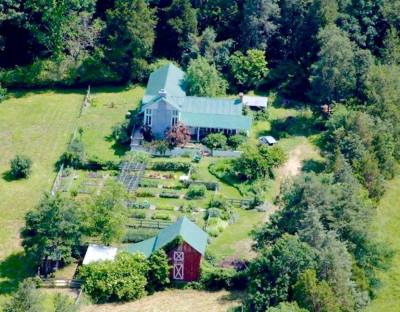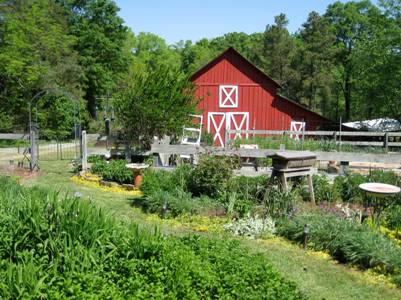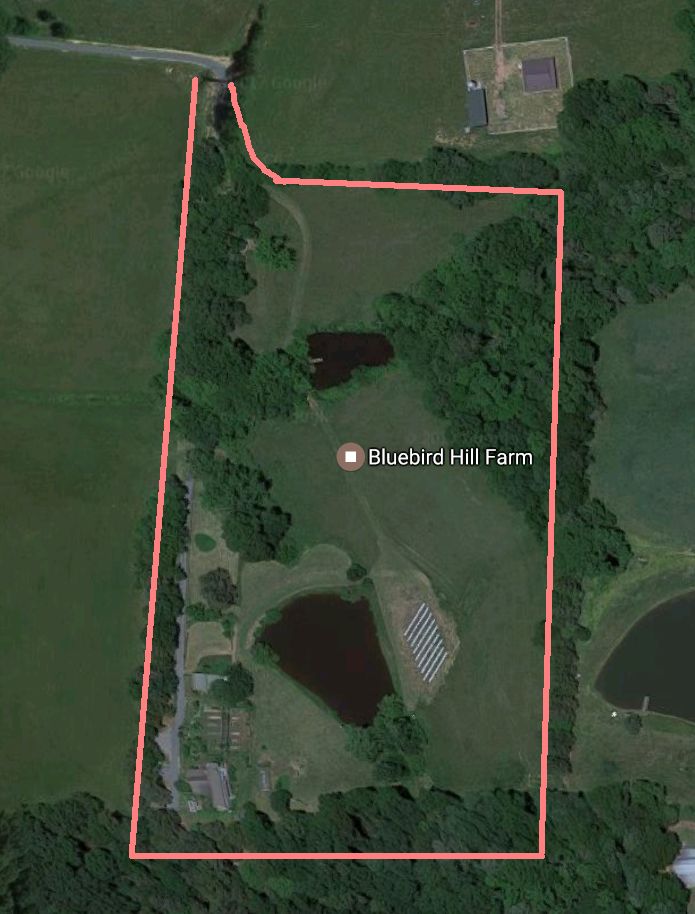No gimmick. This is for real. Someone is going to be the lucky winner of a small organic farm in central North Carolina. What would you do with 13 acres of land? If you’ve got the right qualifications, outlook, and goals, the current owner wants you to take over from here.
The area around this USDA certified organic farm is beautiful, rolling, partially forested, and rural. But it’s sitting in a sweet spot for marketing locally grown produce, herbs, eggs, and added value products. Bluebird Hill Farm is only an hour from Winston-Salem/Greensboro and Raleigh/Durham. It’s also only 2 hours away from the heart of Charlotte – an affluent metro area largely connected to the city’s powerful financial industry. Especially the northern suburbs of Troutman, Mooresville, and Davidson along the I-77 corridor.
 It’s not just productive land. This organic farm comes with a furnished 2 bedroom home, farm equipment, and a small 200-year old barn. Other assets interested parties would find useful include a chicken coop, cold frame, greenhouse, stocked pond, and an herbal distillery. Bluebird Hill is well known for its lavender production. It also has an established CSA program, but the name and logo are not transferred with the property.
It’s not just productive land. This organic farm comes with a furnished 2 bedroom home, farm equipment, and a small 200-year old barn. Other assets interested parties would find useful include a chicken coop, cold frame, greenhouse, stocked pond, and an herbal distillery. Bluebird Hill is well known for its lavender production. It also has an established CSA program, but the name and logo are not transferred with the property.
What’s wrong with it? Apparently nothing. The house and barn were restored from derelict conditions almost 2 decades ago. By retired architects, no less. It’s an age thing. The current owner and farmer are simply ready to retire – for the second time. Norma Burns and her husband started this organic farm after retiring from architectural careers. He passed away a decade ago, and she’s been working it without him ever since.
She knows from experience that the secret to making an organic farm successful takes a lot more than working full time. Because farming is not really a career – it’s bigger than that. You spend so much of every day working a farm, that it has to be what your life is all about. So, it makes perfect sense that only entries from a couple in a committed relationship are qualified. Farming is a team endeavor, both people need to be on the same page to succeed. Paying people to do the work is possible if you’ve got lots of working capital. But the outcome is not the same, and farm profits are much lower.
 Another requirement for entering the contest is age; the couple must be at least 20 years old, and no more than 50. You’ve got to have some stamina to be a farmer. The current owner of Bluebird Hill knows all too well how taxing a full day is when you hit an advanced age. She could just sell it outright, but that wouldn’t ensure that it will continue as a farm in the future.
Another requirement for entering the contest is age; the couple must be at least 20 years old, and no more than 50. You’ve got to have some stamina to be a farmer. The current owner of Bluebird Hill knows all too well how taxing a full day is when you hit an advanced age. She could just sell it outright, but that wouldn’t ensure that it will continue as a farm in the future.
Wouldn’t it be wonderful if more retiring farmers looked at the transfer of their land like this? Conventional farms sell to the highest bidder. The future land use isn’t normally important, but to an invested organic farmer, what happens to the soil they built is. Blood, sweat, and tears is a world apart from going big, automation, and chemically-induced commodity farming.
A lot of the groundwork is already done at Bluebird Hill Farm. The acre of lavender has grown into an agro-tourism calling card. The buildings are in good repair. The soil on 3 acres is USDA certified for organic production and the option of adding another 8 acres of pasture/hay field into cultivation. Leaving about 2 acres of pond and perhaps some woods… future mushroom and ginseng production zone? And the immediate neighborhood is very organic farming friendly. Surrounding farmland is pasture, so there is no spraying of ag chemicals going on in the vicinity.

Organic Farm Contest Parcel – Bluebird Hill parcel (boundaries shown approximate)
As far as climate goes, you’ll be able to grow a lot of things in this location thanks to the long growing season. Rotational crops and intensive farming are definitely possible. The soil is red clay, but diligent amending will improve the acres not yet in cultivation. The farm sits squarely in USDA hardiness zone 7b, a very mild climate with short winters that bring lows of 5°-10°F. Your cropping year is long, snow is rare and generally melts quickly.
That parcel looks lovely, doesn’t it? Lots of open sunny ground, and not one pond, but two! The lot lines shown are approximate. There’s a link to that map below, so you can easily visit the farm and the neighborhood.
It isn’t free, but pretty darn close to it. You won’t need a mortgage or a farm loan. The cost to enter the organic farm contest is $300 and 200 words.
So, young and energetic landless organic farmers… sharpen up those essay skills. Why do you want to own an organic farm? You have to convey you and your partner’s desire, work ethics, and goals convincingly in short order. Two hundred words are less than half a page in Microsoft Word at a font size of 11px. And last, but not least, you’ll need to include a short resume of your growing experience.
Entries must be postmarked no later than June 1st. The farm will announce the winner on Facebook on June 30th. The contest rules require a minimum of 1500 entries.
Do not attempt to contact the farm. It will result in instant disqualification. Dig deep for more info…
Some Useful Links:
- A Gift of Good Land (rules & property info)
- Bird’s Eye View
- Some Farm History
- Land Use/Neighborhood Info
- Bluebird Hill on Facebook
- Charlotte Observer (source)
- Interview with Norma
Images courtesy of Bluebird Hill Farm.